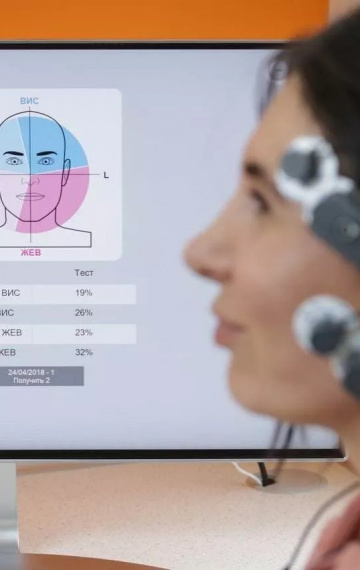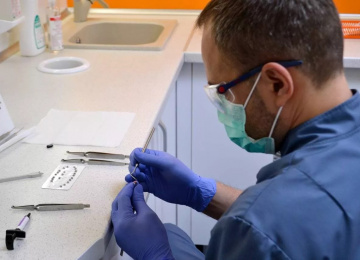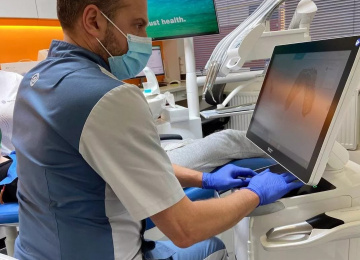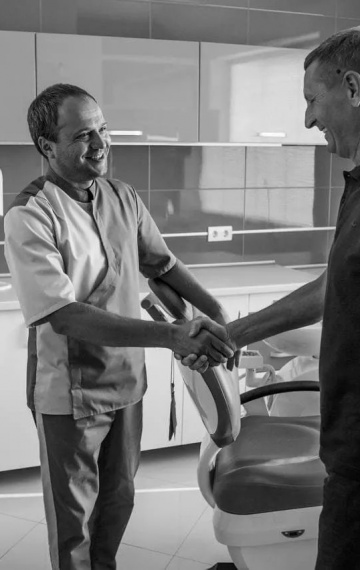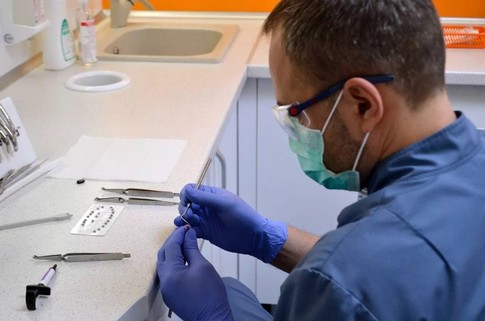
Many people have a fear of dentists, perhaps from bad experiences in childhood, and choosing a dental practice can be a chore. But there’s a dental practice in Lviv, in western Ukraine, where patients and dentist effectively choose each other, and collaborate during treatment. In just five years, the practice – the Symmetrica Dental Restoration Centre – has pioneered this unique concept. Here, dentist and the business’s owner Andrii Ivantsiv shares the secrets of his philosophy to dentistry, and the roots of his success.
Pursuit of excellence
As a child I knew I’d be either a doctor or a lawyer. There are a lot of doctors in my family, and my parents are dentists. I remember walking into hospitals, inhaling the smell, and feeling in my element. My life's vocation was determined even then, although I also obtained a law degree later.
In medical school, I was very interested in psychology, but when I encountered the realities of Soviet psychiatry I immediately decided to have nothing to do with it. And as a frequent visitor to the ophthalmology department, I couldn’t understand why all the doctors who helped people restore their sight wore glasses themselves. There was something about it that didn't feel right to me. Now this branch of medicine is developing rapidly, but it’s all just reading letters on a card and then getting the right prescription and choosing glasses – there’s no creativity!
Art clubs, and sculpture and ceramic studios instilled in me a desire to create beauty, to help people qualitatively change their lives. But I wasn’t interested in plastic surgery – why create beauty with a scalpel? We create it in a different way at our centre.
A skill that has stood the test of time
The history of the Symmetrica Centre began with the Aquarel Children's Studio of Dentistry and Orthodontics, which I founded in 2008. The parents of my young patients liked my approach; they were satisfied with the results of their children's treatment – and they also decided to undergo treatment themselves. I got the opportunity to observe two or three generations of the same family and got to know their physiological features. Over time, the tools I had at my workplace became insufficient. That’s how we grew – we “matured” in line with our needs.
At the end of 2015, I opened the Symmetrica Dental Rehabilitation Center, leaving the play, joy and celebration of childhood in Aquarel, and at the same time – giving adult patients peace, comfort and cosiness in a separate, spacious area.
Health outside is health inside
Our centre is based on the philosophy of symmetry and balance of human life, which is reflected in the human face. The slogans of our company are the following: “Health outside is health inside” and “Nothing more – just health.”
The human body is designed in such a way that it’s not possible to restore the health of one organ while neglecting others. You’ve got to remember that the maxillofacial organ (lower jaw) is part of the musculoskeletal system.
I’ve experienced one case in which a person had to have his hip joint replaced because one of his sixes (a molar tooth), which is the “key” to the occlusion (the “bite,” or how the upper and lower teeth come together), was removed at an early age. This removal caused a deformity, an underbite, clicking, and overloading on one side of the face. Accordingly, the body compensated for this “failure” in neuromuscular circuits in other parts of the body.
In general, a person's whole life can be “read” in their teeth – you just have to look at it properly. You can look at only one tooth, or you can look at the jaw, or you can look at the whole biological system.
One of our strengths is that we have advanced digital diagnostics: We create a digital copy of the patient using computer tomography, myography and axiography – making facial and dental scans. Based on this digital prototype, we visualise the optimal treatment plan for the patient, and even at this stage the patient can see how their maxillofacial system is going to be changed. The patient can also visit our laboratory, feel each product by touch, and get to know what material is going to be used for the orthopaedic constructions.
Today, our centre has all of the most modern technical equipment that exists in the dental field, and a large, experienced team that follows the same philosophy.
I often go abroad on business and talk to my European colleagues. They’re amazed at us. German dentists don’t even buy such advanced equipment – everything they have is “old-fashioned.” Ukrainian medicine really is at a very high level.
Customer-centric in a new way
We’re not looking to treat everyone – the patient has to realise there’s a need to change something, and want to do it. When a person comes to the centre for a consultation and we start getting to know each other, I immediately know whether we can or can’t work together. Our treatment is a collaboration between the doctor and the patient, and the success of the treatment depends on this collaboration. We always focus on the patients’ medical problems, taking into account their life circumstances and problems.
Despite that, the flow of patients is endless. While people tend to “wander” among clinics – in one clinic they have a tooth removed, in a second they have a tooth treated, in a third they have their bite straightened, in a fourth they get a filling – in five years such a person will be one of our patients.
Growth of management
My team includes an executive director, a financial director, a marketing unit – a very large management team, and lots of accounting tools. Nobody else thinks like that in dentistry.
Sometimes patients want me to treat them personally. But I always say that the specialists at the centre are divided into certain fields, each of them hones their knowledge and skills in a specific field, so these doctors can make much more effective decisions. In fact, training a specialist takes a lot of time, it’s expensive and energy-consuming, but today I can calmly delegate work with full confidence to my colleagues in the centre.
The growth of Symmetrica is down to two factors: firstly, it is my constant dissatisfaction with the result and the desire to improve everything; secondly, at the beginning of my career I dreamed of building a large company.
Participation in public organisations
I’m always supporting public initiatives and looking for partners. Thanks to the “Lviv cluster of medical businesses,” we’ve established a partnership with another medical centre, with which we plan to provide comprehensive treatment for patients with difficult cases. The cluster helps find conscientious potential partners. It’s a valuable kind of interaction that allows us to exchange experience and practices.
We also won a voucher for consulting services as part of the COVID-19 Business Clinic initiative under the “EU4Business: Competitiveness and Internationalisation of SMEs” project, which is jointly financed by the EU within the EU4Business initiative, and by the German government, and implemented by the German federal company Deutsche Gesellschaft für Internationale Zusammenarbeit (GIZ) GmbH. The knowledge we gained during consultations will help us to automate some of our company’s work processes.
Business advice
Decisions have to be made quickly. The system works like this: action — result — analysis — until you achieve your goal. The winner is the one who does it quickest.

